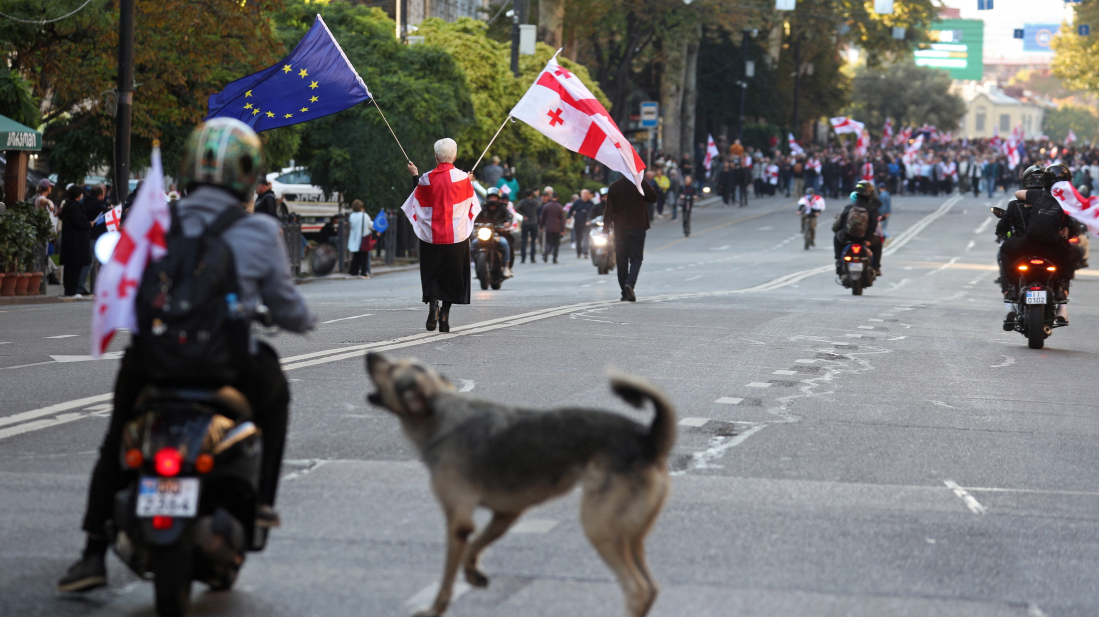Iran designates EU naval and air forces as ‘terrorist entities’ in reciprocal move
Iran announced on Saturday that it has designated the naval and air forces of European Union member states as “terrorist entities” in a reciprocal...

Ties between Tbilisi and Brussels continue to deteriorate following the 4th October 4 local elections which saw the opposition hold a rally on the day of elections.
So far around 45 people have been arrested in connection with the protests which saw protesters attempt to gain access to Georgia Presidential Palace but were dispersed by Police.
In a striking accusation, Parliament Speaker Shalva Papuashvili claimed that “Brussels is behind the street wars in Tbilisi.” echoing Hungarian Prime Minister Viktor Orbán’s recent criticism of the EU’s so-called “war plans,” Papuashvili argued that the European Union’s “peace project” increasingly resembles a “war project.”
His comments mark a dramatic escalation in Georgia’s political discourse — and a clear sign of ideological realignment within parts of Europe.
Papuashvili’s statement reflects a broader trend among conservative and nationalist movements across Europe, which accuse Brussels of overstepping its authority and eroding traditional values.
From Budapest to Tbilisi, political leaders are tapping into scepticism toward the EU’s liberal agenda while promoting a narrative of sovereignty and identity.
The OSCE Parliamentary Assembly’s Special Representative for the South Caucasus, Luis Graça, has voiced alarm over what he described as “increasing tensions and violence” that erupted during and after the vote.
In a statement, Graça urged Georgian authorities to uphold democratic principles, respect the right to peaceful assembly, and allow civil society to operate freely and without fear.
“Democratic governance must be based on the rule of law, accountability, and peaceful political dialogue,” Graça said, calling on all parties to refrain from violence and engage constructively within legitimate political processes.
While the OSCE’s message centres on dialogue and restraint, Georgia’s internal rhetoric has taken a sharply different turn.
Georgia, once seen as a model reformer and an aspirant for EU integration, now appears increasingly aligned with Europe’s conservative bloc. This shift underscores what many analysts describe as Europe’s dual face — a continent split between its liberal-democratic core and a growing circle of states challenging Brussels’ influence.
For Georgia, the stakes are high. As international organizations like the OSCE call for calm and political dialogue, the government’s open criticism of the EU risks complicating its long-term ambitions for closer European ties.
Whether Georgia can balance its ideological sympathies with its strategic aspirations remains to be seen.
Quentin Griffiths, co-founder of online fashion retailer ASOS, has died in Pattaya, Thailand, after falling from the 17th floor of a condominium on 9 February, Thai police confirmed.
At least four people have died and 17 others were injured after a liquid gas truck overturned and exploded in Santiago, Chile’s capital, authorities confirmed on Thursday. Police said the driver was among those killed.
Cubans are increasingly turning to solar power to keep businesses operating and basic household appliances running during prolonged electricity cuts, as fuel shortages make diesel generators and other temporary solutions more difficult and costly to maintain.
Ukraine’s National Paralympic Committee has announced it will boycott the opening ceremony of the Milano Cortina 2026 Paralympics in Verona on 6 March, citing the International Paralympic Committee’s decision to allow some Russian and Belarusian athletes to compete under their national flags.
Eric Dane, the actor best known for his roles in 'Grey’s Anatomy' and 'Euphoria', died on Thursday, at the age of 53 after a battle with amyotrophic lateral sclerosis (ALS). His family confirmed his death after what they described as a “courageous battle” with ALS.
Iran announced on Saturday that it has designated the naval and air forces of European Union member states as “terrorist entities” in a reciprocal move after the EU blacklisted the Islamic Revolutionary Guard Corps (IRGC).
At least 10 people were killed and 50 wounded in Israeli strikes in Lebanon's Bekaa Valley on Friday (20 February), two security sources told Reuters, after the Israeli military said it had targeted Hezbollah sites in the Baalbek area.
Iran’s Foreign Minister Abbas Araghchi on Saturday (21 February) dismissed U.S. claims that 32,000 civilians were killed during protests in Iran. He said Tehran has already released official figures and called for evidence to support any higher estimates.
Uzbekistan's president Shavkat Mirziyoyev has held a series of high-level meetings in the U.S. aimed at strengthening bilateral economic and strategic ties between the two countries.
Türkiye has signalled readiness to contribute to a proposed Gaza stabilisation force during the inaugural Board of Peace meeting on Thursday (19 February), but according to former Turkish diplomat Mehmet Öğütçü, the decisive factor will be whether Israel and the United States agree on Ankara’s role.
You can download the AnewZ application from Play Store and the App Store.

What is your opinion on this topic?
Leave the first comment